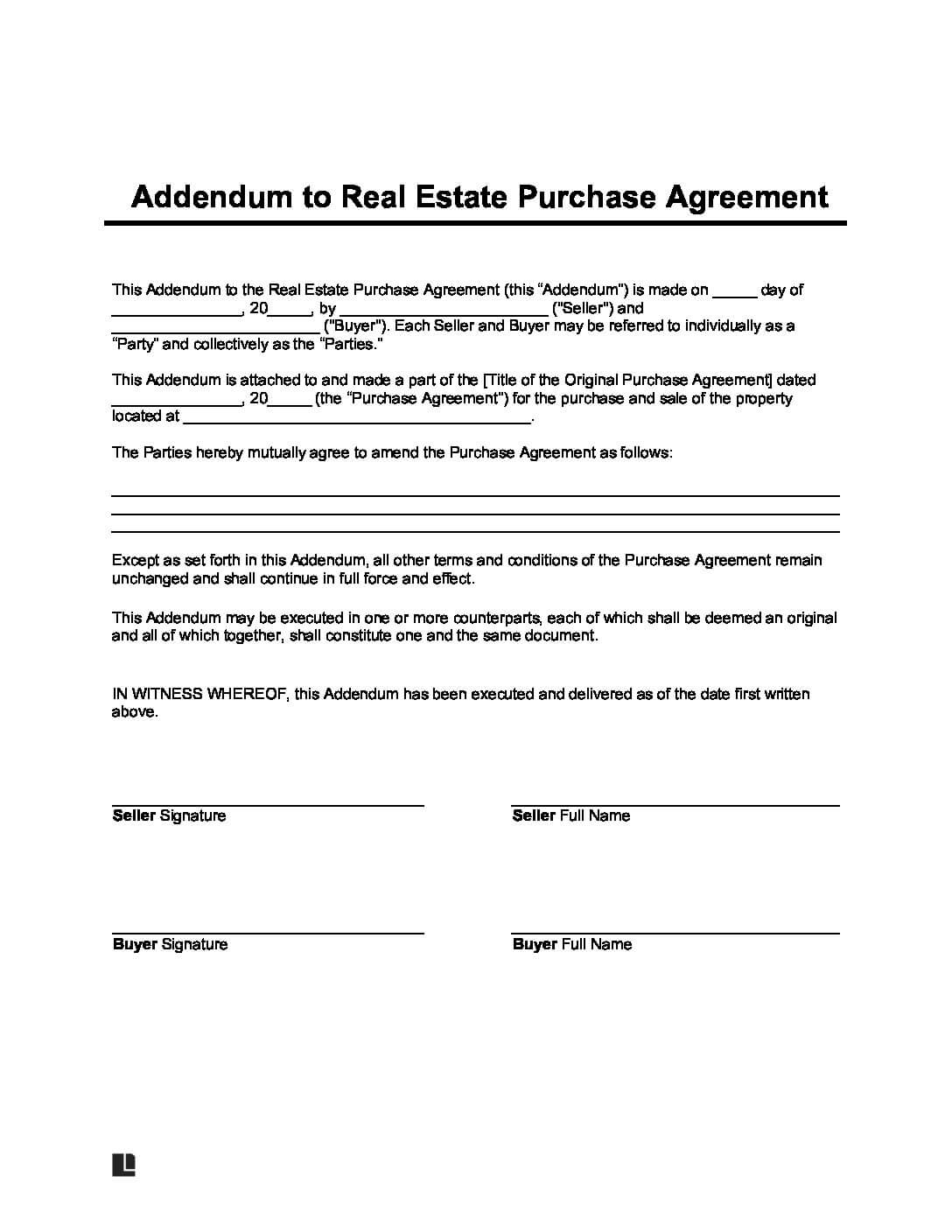Understanding Addendums in Real Estate: What They Are and How They Work

Introduction: The Role of Addendums in Real Estate Contracts
Real estate transactions are complex, often requiring clear, flexible agreements that reflect the needs and expectations of both buyers and sellers. Addendums play a crucial role in this process, providing a legal mechanism to add, clarify, or specify terms in a real estate contract without rewriting the entire agreement. Understanding what an addendum is, how it is used, and the correct way to implement one can help all parties avoid confusion and protect their interests throughout the deal.
What Is an Addendum in Real Estate?
An addendum is a legal document attached to a real estate contract that introduces new information, terms, or conditions not included in the original agreement. Unlike an amendment, which changes existing terms in a signed contract, an addendum supplements the contract with additional details, often before the contract is finalized and signed by all parties. Once both buyer and seller agree to and sign the addendum, it becomes an integral part of the contract and is legally binding [1] [2] [3] .

Source: legaltemplates.net
Key Distinctions: Addendum vs. Amendment
It is important to distinguish between an addendum and an amendment in real estate:
- Addendum: Adds new clauses or terms to the contract before or at the time of signing, supplementing the original agreement.
- Amendment: Alters or updates terms in a contract that has already been executed (i.e., signed by all parties) [4] .
Both documents must be signed by all parties involved to be valid and enforceable.
Why Are Addendums Used in Real Estate?
Addendums offer flexibility and clarity, allowing contracts to address unique situations or requirements not anticipated in the standard contract. Some common uses for addendums in real estate include:
- Home inspection contingencies: Requiring repairs or other actions based on inspection results.
- Financing contingencies: Making the sale dependent upon the buyer securing adequate financing.
- Inclusion of specific appliances or furniture: Specifying that certain items stay with the property.
- Disclosure of important information: Notifying buyers of known property issues, such as lead-based paint or flood zone status [3] [5] .
- Adjusting move-in or closing dates: Setting specific timelines to meet the needs of both parties.
By using an addendum, buyers and sellers can ensure the contract fully reflects their expectations and obligations, reducing the risk of misunderstandings or disputes down the line.
Essential Components of an Addendum
To be effective and legally enforceable, a real estate addendum should include:

Source: esign.com
- Identification: Clearly state the names of all parties, the date, and reference the original contract.
- Effective Date: Specify when the addendum takes effect.
- Details of the Addition: Describe the new terms, conditions, or information being added to the contract.
- Procedures: Outline how the new terms will be fulfilled (e.g., timelines for repairs, delivery of documents, payment schedules).
- Clarification Statement: Indicate that all other terms of the original contract remain unchanged, except as stated in the addendum.
- Signatures: Obtain signatures from all parties to confirm mutual agreement [1] .
How to Create and Implement an Addendum: Step-by-Step Guide
If you need to add terms to a real estate contract, follow these steps to create and implement an addendum:
- Review the Original Contract: Identify what needs to be added or clarified.
- Draft the Addendum: Use clear language to specify the new terms, making sure they are detailed and unambiguous.
- Reference the Original Agreement: Include information linking the addendum to the specific contract (e.g., address, contract date, parties involved).
- Consult a Real Estate Professional or Attorney: Consider seeking guidance to ensure compliance with local laws and that the language is enforceable. State regulations can affect the validity and requirements of addendums [1] .
- Present the Addendum to the Other Party: Share the document with the buyer, seller, or their representatives for review.
- Negotiate and Finalize: If either party requests changes, revise the addendum as needed until both sides agree.
- Sign and Date the Addendum: All parties must sign and date the document for it to become legally binding.
- Attach the Addendum to the Main Contract: Keep the addendum with the original agreement and submit copies to all relevant parties.
You can use standard addendum templates available from your local real estate association or request one from your real estate agent. For more complex situations, consult an attorney or a licensed real estate professional for help drafting the document.
Practical Examples of Real Estate Addendums
To clarify how addendums work in practice, here are some typical scenarios:
- Repair Addendum: After a home inspection, the buyer requests that the seller repair a leaking roof before closing. The addendum details the specific repairs, who will pay for them, and by what date they must be completed.
- Contingency Addendum: The purchase is made contingent upon the buyer securing financing by a certain date. If the buyer cannot obtain a mortgage, the contract can be cancelled without penalty.
- Inclusion Addendum: The buyer requests that the refrigerator, washer, and dryer remain with the property. The addendum lists these appliances and states they must be in working condition on the closing date [3] .
- Closing Date Addendum: Both parties agree to move the closing date from the original contract to a new, mutually convenient date. The addendum specifies the new date and any related changes in obligations.
In each case, the addendum spells out the new terms clearly, ensuring both sides understand their responsibilities and expectations.
Potential Challenges and Best Practices
While addendums are powerful tools, they must be used carefully to avoid legal disputes or confusion. Some potential challenges include:
- Ambiguous Language: Vague or unclear terms can lead to disagreements. Always use precise language and specify all details.
- Failure to Reference the Original Contract: Neglecting to link the addendum to the correct contract can result in enforceability issues.
- Missing Signatures: An unsigned addendum is not legally binding. Verify all parties have signed and dated the document.
- Non-Compliance with State Laws: Addendum requirements can vary by state. Consult a local real estate professional or attorney to ensure compliance with local regulations [1] .
To avoid these pitfalls, use standardized forms when possible and seek professional assistance for complex transactions.
How to Access and Use Real Estate Addendums
If you are involved in a real estate transaction and need to add terms to your contract:
- You can request an addendum template from your real estate agent or broker, who typically has access to state-approved forms.
- If you do not have an agent, contact your state or local real estate association. Many provide standardized forms for buyers and sellers.
- For unique or complex situations, consult a licensed real estate attorney to draft or review the addendum for you.
- Be sure to review all documents thoroughly before signing and retain copies for your records.
If you need help finding these resources, search for your state’s real estate association or “real estate addendum form [your state]” online, or ask your local board of Realtors for guidance.
Alternative Approaches and Additional Guidance
In some cases, the standard contract may be sufficient without an addendum, especially for straightforward transactions. However, if you anticipate changes after the contract is signed, you may need to use an amendment instead of an addendum. Always communicate openly with the other party to determine the best approach.
For those seeking further guidance, consider reaching out to a licensed real estate agent or attorney in your area. They can help you understand your rights, obligations, and the best way to achieve your goals during a property transaction.
Key Takeaways
An addendum in real estate is a vital tool that ensures contracts are tailored to meet the unique needs of buyers and sellers. By understanding how to properly create, implement, and use addendums, you can protect your interests, reduce the risk of disputes, and ensure a smooth property transaction. When in doubt, always consult a real estate professional or attorney to make sure your documents are accurate and enforceable.
References
- [1] National Association of Realtors (2024). Real Estate Addendums: Expert Tips for Agents.
- [2] Azibo (2024). Addendum – Glossary Definition.
- [3] Century 21 (2017). Addendum – Real Estate Glossary.
- [4] HelloData (2024). Amendment vs Addendum in a Real Estate Contract.
- [5] PandaDoc (2024). What Is an Addendum in Real Estate?






